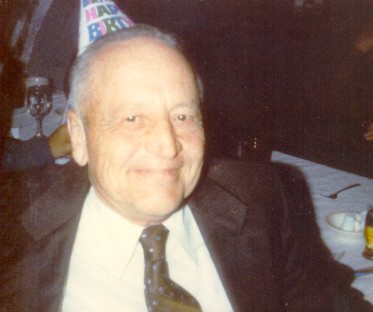
Sometime in the 1980's
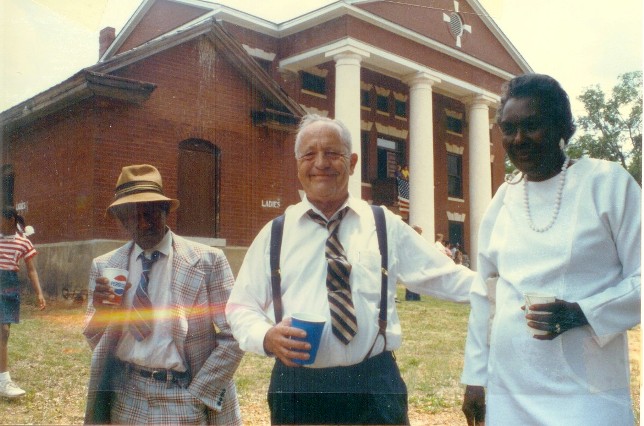
With friends in front of old Russell County Courthouse in Seale, Alabama
(photo by Brad Carroll)
 Sometime in the 1980's |

With friends in front of old Russell County Courthouse in Seale, Alabama (photo by Brad Carroll) |
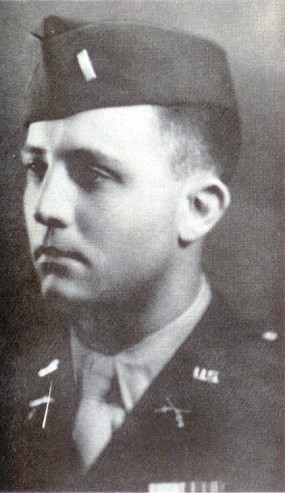 OCS Training at Ft. Benning, Ga. 1943 |
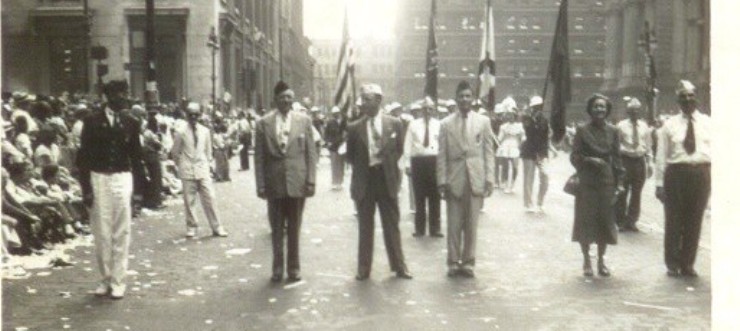
Left-To-Right Bill Perry, unknown, Arch Ferrell (glancing right), Pelham Ferrell, Hazel and Hugh Overton American Legion parade, Washington, D.C., late 1940's, Alabama section. |
|
II .. The Man Who Was Sober, Respected, Often Sought After, and Who Lived Quietly Arch Ferrell quit alcohol in May 1962, and thereafter always seemed to be happy and stable. I never detected any "demons" in his mannerisms over a 30-year period that betrayed any guilt. in fact, the Arch Ferrell that I knew was a remarkable person, even if he hadn't been my actual blood-kin uncle. His indictment and acquittal for murder just proves that those who drink too much are easy political targets, and are somewhat easy to frame. Arch was the only "Ferrell" who ever had any real problem with alcohol. I clearly remember how Arch showed my mom his "revitalized" plum orchard probably at about this time; circa 1963. Soon after, the plum orchard again went "out of control" as Arch was always on the road selling automobile oil-additives to filling stations for his brother-in-law's business. Later he sold and distributed products to hardware stores as a traveling sales representative. But Arch apparently never touched alcohol again though he was always a visitor at all major social functions in the area. He would be asked to give graduation speeches at schools, and other oratorical addresses. He had an excellent speaking voice from a bygone era just like his dad. His sister, my mom, in the 1961-62 era had been baking him cakes a few times a month as an inducement in the hope that the tons of sugar from the cakes would satisfy his liver's craving for alcohol. This was a popular method being used then to help alcoholics kick the habit. I remember my mother's checking on her brother to see if he was actually eating the cakes she was baking, such as the visit when the plum orchard was toured. Arch and mom discussed the history of that decision of his on many occasions, and in the area he became increasingly known as someone who no longer drank. He became a regular at AA meetings my mom told me. He became a regular visitor to our various family homes for the rest of his life, doing so on an almost monthly basis until his death of a heart attack in 1993. His house was located on old U.S. Highway 431, just south of the then-city limits of Phenix City, Alabama, the town itself considered part of the metro-Columbus Georgia area. In 1969, some fourteen years after having his law license revoked, Arch got it back, doing so at the urging of his brother, Pelham Ferrell, who himself was a long-time respected local attorney, just as their father Henry Archer Ferrell had been. Arch then restarted his law practice in the Aumont Building on Phenix City's Broad Street, and he was still practicing when he died in 1993. Most of those currently alive who knew Arch over the last 30 years of his life knew someone who was always sincere, sober and always helpful. III .. The Trials, the Acquittals, Politics Of The Day, and a bit of the Aftermath Now, about his 1955 Vote Fraud and Murder trials ... Cartoon-quality-prosecution sunk the cases against my uncle. I will from now on respect the findings of the jury that found my late uncle "not-guilty" of the charge of vote-fraud. Previously, I had simply repeated what was printed by various slander-rags without realizing that I was repeating a lie. The main witness against my uncle in that trial was a perjurer. The general public should know that the vote-fraud charge was a failed set-up. Exactly what happened in that election has never been analyzed by me. The common version may change if we reject a commonly repeated perjury artifact from the failed prosecution of my uncle. One thing is clear ... Arch Ferrell never carried a gun after the scandals, and lived among his friends in Phenix City after 1954 until his death. All those who knew Arch Ferrell knew an extremely systematic, methodical, some say plodding, thinker and intellectual. He drove slowly -- so slowly that it irritated me whenever I had to go anywhere with my uncle. During the Reagan years when 55 miles per hour was the national speed limit, Arch never drove even one mph. over 55. He spoke methodically, perfectly, and never rushed or behaved in an erratic or impulsive way. No wonder both juries returned not guilty verdicts !! The man described by the prosecution was someone who ran quickly from the scene of the murder. If Arch Ferrell had actually shot Patterson, the Arch Ferrell I knew would have leisurely pulled the trigger and slowly walked away. Arch Ferrell was NOT a nervous, jumpy, running around type. The bizarre character described by the prosecution in the Arch Ferrell vote-fraud trial was so cartoon-like, so radically different than the real Arch Ferrell that thousands of people knew; they could ot convict a person based upon such obvious attempts at political character assassination. Perhaps the prosecution, by attempting to create an "artificial Arch Ferrell" for the manipulated jury in the trial, distorted their case until it became non-credible. The real Arch Ferrell was not a neurotic schemer or plotter. I once asked Arch directly in 1980 if he had killed Albert Patterson, and Arch said, "No, and I don't know who did it." I've never heard any coherent rumors about who actually did it other than the general belief that it was probably a hired killer not from the local area, and unknown there. Corruption? Regulation and Taxation... Barnes (the Barnes Book ??) confirms what Arch told me in 1980, that the State of Alabama was taxing and regulating the slot machines in Alabama by requiring that each machine have a current revenue stamp affixed. How much longer would it have been until all the other gambling activities came under official regulation? In my 1980 conversation, after being told by Arch that the slot machines were virtually, or actually legal, and being taxed, I asked him about any other regulation or "control" that his office was engaged in regarding "gambling" and alcohol in "ole Phenix City". He told that Mayor Cobb's policy, one that Arch continued when he became the D.A., was to periodically levy a regular "fine" on the various joints and saloons. No one was ever arrested or shut down, but the city received tons of money from this policy. Due to an extreme "bible-belt" mentality there at that time, true legality wasn't politically possible for some of the activities, but it is unclear as to what was really legal and what was illegal. There has never been a rational explanation in the Columbus Ledger-Enquirer about what, exactly, was illegal, and what was legal. From the city's point of view, and considering all the previous judicial decisions, I think the words "corruption" and "illegal" are perhaps being used in an inappropriate manner. Around the time in which Patterson's murder occured, the only law against slot machines or poker was a misdemeanor law against maintaining a house where gambling was taking place, the penalty being a $500 fine. There was also a law against lotteries, apparently. Every penny received in fines by the City of Phenix City was recorded and made part of the public record. Is this corruption? One interesting point of history is that on the night that Albert Patterson was murdered, Arch Ferrell luckily was not drunk, and this fact was skillfully relayed to the jury and into the history books. If Arch Ferrell had even once answered a question on the witness stand with the reply, "I can not remember", the implication that this voided memory was due to alcohol would probably have sunk him. As it would turn out, Chief Deputy Sheriff Albert Fuller was found guilty on nearly the same flimsy evidence that had not been believed by the Ferrell jury. Meanwhile, the third indivdual charged with Albert Patterson's murder, as well as vote fraud, this being Si Garrett, who served as Alabama Attorney General from 1951 to 1954, was never put on trial. Shortly after Patterson's murder, Garrett was confined to a mental institution. Richard Flowers, who replaced Garrett as state Attorney General, the post which the murdered Albert Patterson had sought, opted to drop all of Garrett's fraud and murder charges. Incidentally, Flowers would be succeeded by Patterson's son John, who was elected to the Attorney General's office in place of his father. The sad and final truth, or so it would seem, is that the real killer (if not more than one) of Albert Patterson was probably never found and tried. IV .. More fallout after 1954-55 and an attorney's road back to reinstatement Considering the power that the Patterson clan enjoyed for many years during this period of Alabama history, the parole of Albert Fuller in 1965 indicates that he must have been considered "not-guilty" as well. The idea that the parole board would have paroled the actual known murderer of Governor Patterson's father after a mere 10 years in prison is, in this writer's strictly personal opinion, absurd to the max. The parole of Albert Fuller occurred in 1965. He then lived in Mobile Alabama, dying there in 1969 due to injuries suffered in a fall from a ladder. Upon his release from confinement in a Texas mental institition, Si Garrett lived quietly in Montgomery Alabama, dying there in 1967 after an illness. In what can best be labelled as an absurd delusional theory, perhaps born out of the fact that no other persons beyond Fuller, Ferrell and Garrett were ever charged and tried for Albert Patterson's murder, the Alabama Bar Association would, some ten years after Arch Ferrell's 1955 vote fraud and murder acquittals, affix the tag of "uncaught murderer" upon the then-disbarred Arch Ferrell. As already noted, his Alabama attorney's license was restored by the very same group in 1969. In our 1980 conversation, I asked Arch why he had been disbarred by the Alabama Bar Association, and he told me that no reason had ever been given or recorded. He had just been framed apparently for murder and vote-fraud according to two different Alabama grand juries, and then found not guilty of both charges, so the disbarment fits in with the presumption (possibly prejudiced) of guilt. When he was found not guilty in both trials, I personally believe that the disbarment should have been tossed out a lot sooner. V .. Early Days, Phenix City Since 1954-55 and Some Final Notations What did Arch's father, Henry Archer Ferrell, do during the Great Depression? Since income from practicing law was severely curtailed by the depression economy, the senior "Arch" turned to growing vegetables as a secure way to guarantee that his family, including Arch the younger, was fed and educated. If Russell County was as corrupt as some say, then why was my grandfather not drowning in wealth? Instead, he was working with his own children in the hot sun growing organic/bio-dynamic table vegetables for the citizens of Columbus, Georgia since he was not given other choices to pursue. Pause for A Note In the early 1970's when I was explaining to my mom what "organic" meant, she interrupted me and told me the whole story of "big daddy's truck farm", and how all this manure was acquired (purchased), bartered for, or obtained for free, etc., etc., and how the soil was "built up" over time, etc., etc. She was explaining more or less what the latest "whole earth" books were talking about; basically the hippie-organic food movement was just picking up steam back then in the late 1960's and early 1970's. Resuming ... My mother used to recall how aggravated she was at the time for having to work so hard on "big daddy's truck farm", but she also admitted that the family had plenty of food, shelter, and clothing during the great depression, and just enough money, and had their own milk cow. But things were rough for everybody out in the country, and legal bills were often paid in livestock or produce since money was scarce. Another Thing -- Gambling was not a crime in Alabama until recent post-Phenix-City-era years, though theft (larceny) is still illegal. Gambling and drinking were accepted and expected in early-American society. The saloons of Phenix City, Alabama (part of the metro-Columbus, Georgia area) had remained continuously open and mostly unregulated since the founding of that settlement in the early 1800's until sometime after 1933 when alcohol was re-legalized in the state and alcohol came under regulation and taxation. I don't know when prohibition of beer and hard liquor for sale in closed containers ended, but prohibition of "mixed drinks sold by bars, lounges, etc., ended in 1951. Big Jim Folsom, Gordon Persons, Arch Ferrell and Silas Garrett were likely responsible parties for this, although it was already some three years old when the murder of Albert Patterson occurred in 1954. From 1954 until into the early 2000's, most nightclubs, entertainment, lounges, bars and the like have been located over in the Columbus Georgia side of the Chattahoochee River. Going forward from the early 2000's, there has been some increase in bar and grill establishments on the Phenix City side. Whatever reform efforts deserve to be credited to any mostly discredited politicians associated with the commercial section of "ole-Phenix City", has remained nearly completely unheralded and unreported to this day. The murder and scandals occurred precisely at a point when Russell County was trying to transform itself from a prohibitionist-era saloon town area into something more civilized. The recently retired bond issues, new Phenix City courthouse (the one still there) and jail (now there's a new jail; the old one was torn down and is now part of the parking lot), hospital, paved streets, numerous schools, and other civilized improvements were also attributed to the "gamblers" group. Most of these old buildings are still in use today, having been built to last. However, some long-time staples, such as the Homer D. Cobb Memorial Hospital, have been abandoned and torn down -- all in the name of the great god progress -- to make way for other types of structures. I sometimes wonder if there were some unemployed former bootleggers who may have had some grudges against my family (and the clean-up "Christian" group both) for how poorly they may have faired after all the bootleggers "went-out-of-business" when cheap-legal-beer and other alcohol began to make its appearance again after 1951 (and 1933 when U.S. Prohibition ended). All these wretched people may already have expected "further reforms" to occur quite soon that they reasoned, would leave them out as it had in the past. Today, people who wish to gamble in Phenix City generally play state lotteries in Georgia, Florida or other states which have the games, as there is still no lottery anywhere in Alabama. Most of the Ferrells that I have known always seemed to be "anti-prohibitionist", but mostly moderate drinkers if at all, sometimes smokers of tobacco but often abstainers from tobacco. Arch Ferrell seems to be the only "falling-down-drunk" Ferrell that anyone remembers, though alcohol was always there to some extent in the Ferrell family, anyway. |
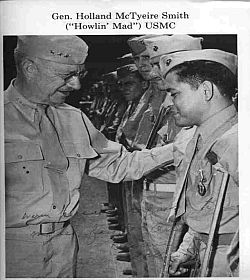 This signed photo was a gift from Gen. Smith to Arch's dad. |
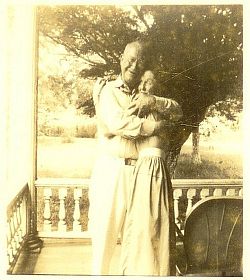 General and Mrs. Smith Late 1940s or Early 1950's |
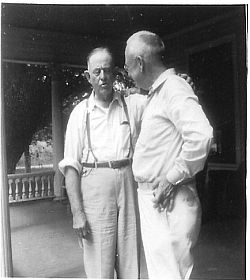 Henry Archer Ferrell and General Smith Late 1940s or Early 1950s |
|
What's interesting is that I had almost never heard of General Smith until the 1982 Historical Commisssion book was published with his photo (shown above, congratulating a soldier). My mother and uncles kept him a secret for the most part. After learning about him and the fact that he was their next door neighbor, I suddenly began to understand some of the influences on that family. On the other hand, he was following orders for decades in all sorts of places. Did he vote? As far as things like socialism and fascism, Gen. Smith probably could probably have cared less. All in all he seems like he was a fairly decent guy, I have to admit. When WWII ended and General Smith returned home to Alabama, two individuals were asked to meet him at the airport in Montgomery, Alabama to take him by car to Seale. Those individuals were a U.S. Marine from East Central Alabama during WWII, Cecil G, Brown, a pharmacist and my "uncle" by marriage, as well the junior Arch Ferrell's brother, my other uncle, J. Pelham Ferrell, who had served in the U.S. Navy during World War II. Another of Arch's brothers, Gordon S. Ferrell, enlisted in the U.S. Marines and fought with distinction during World War II. Cecil and Pelham drove General Smith back to his Alabama home town of Seale. Later that day, the General was honored in Seale with a large Bar-B-Q dinner which hundreds (if not thousands) of citizens and well-wishers attended. Later, General Smith moved to Southern California where he died of natural causes in 1967. The General is considered by military historians to be "the father of amphibious warfare", and led many battles in the Pacific against the Japanese. Factually speaking, he is also among the greatest fighters of fascism to have ever lived, in literal historical terms. From Wikipedia .... A biography of General Smith. From the Historical Marker Database ... Details of a Marker located near his home in Seale, AL. |